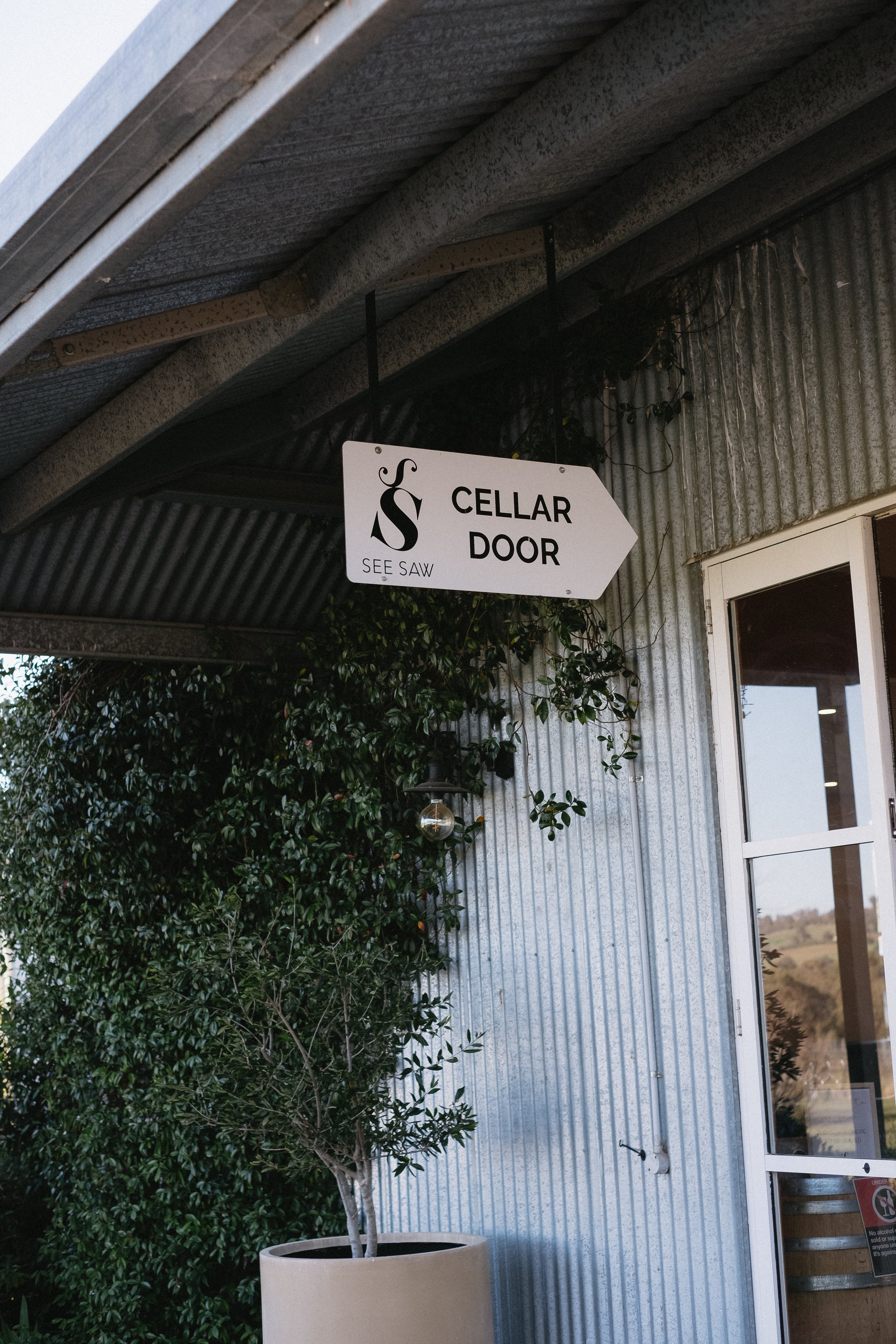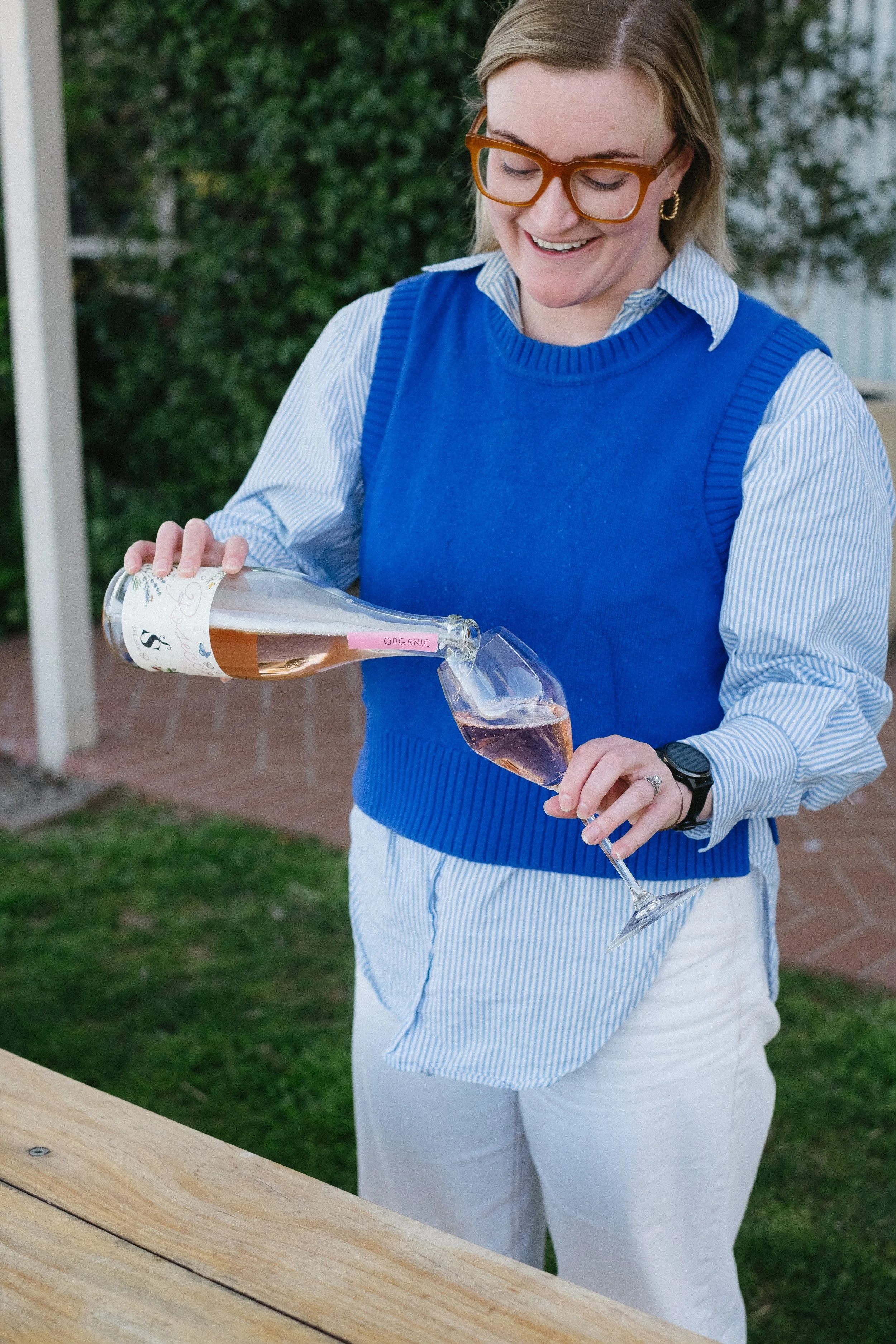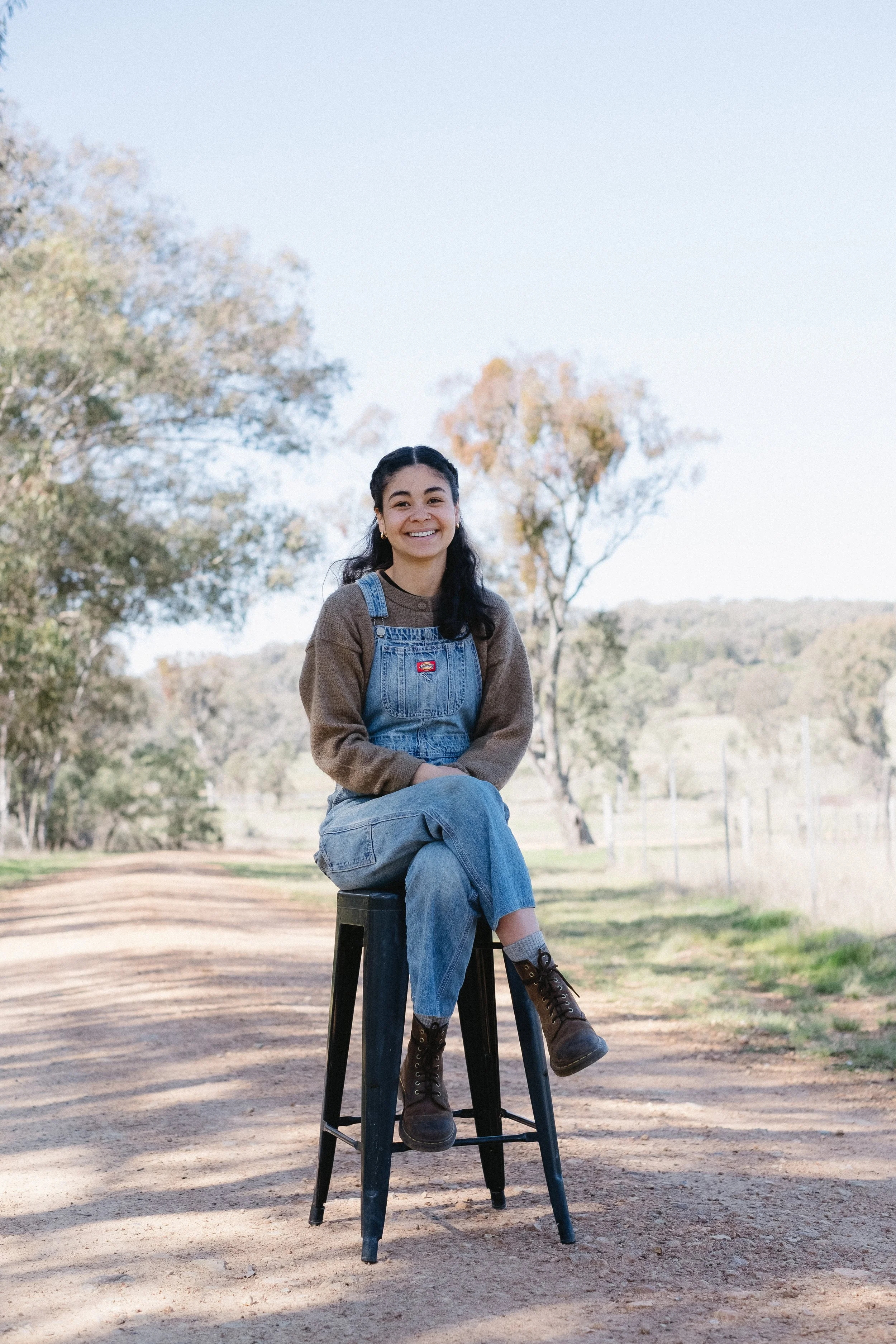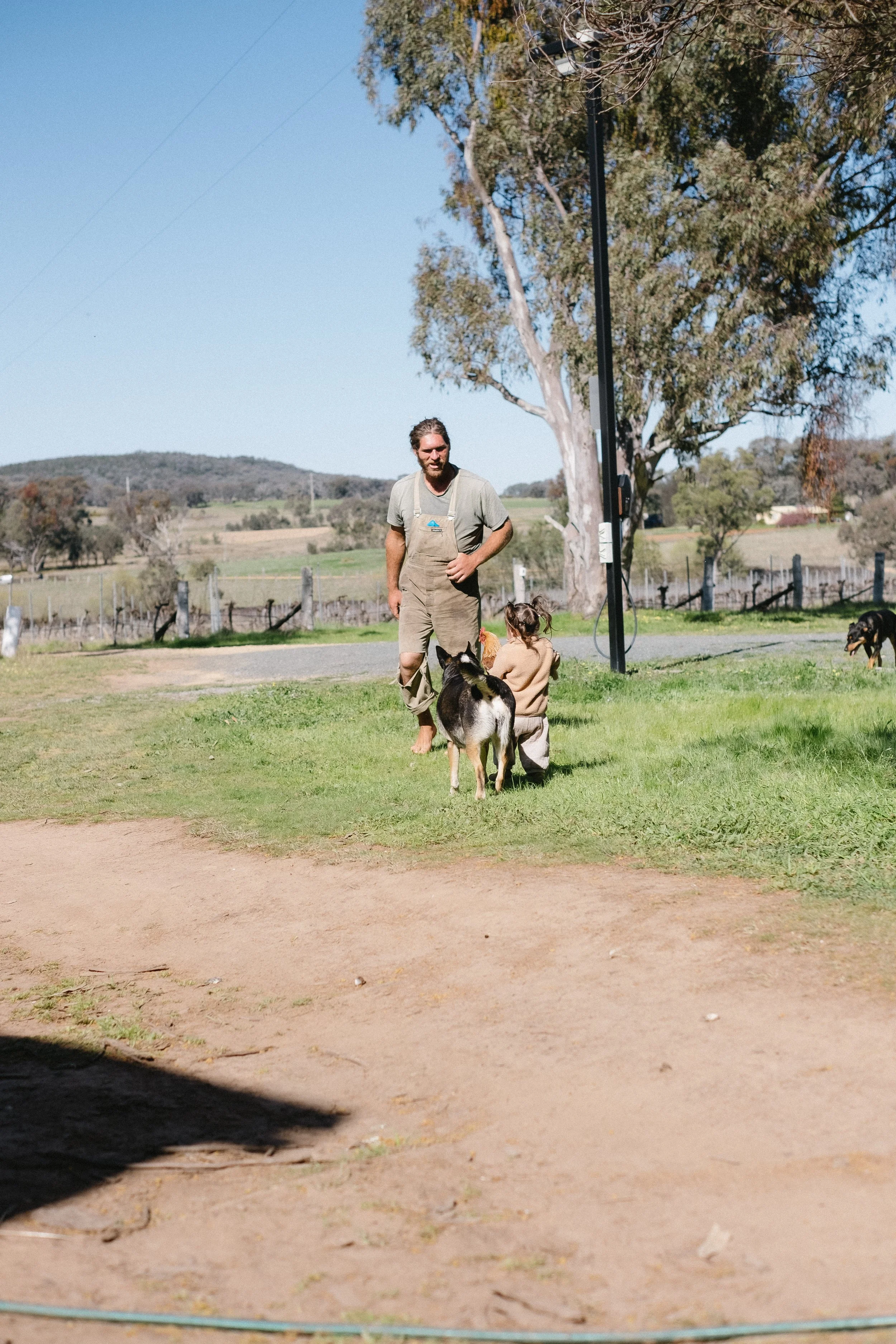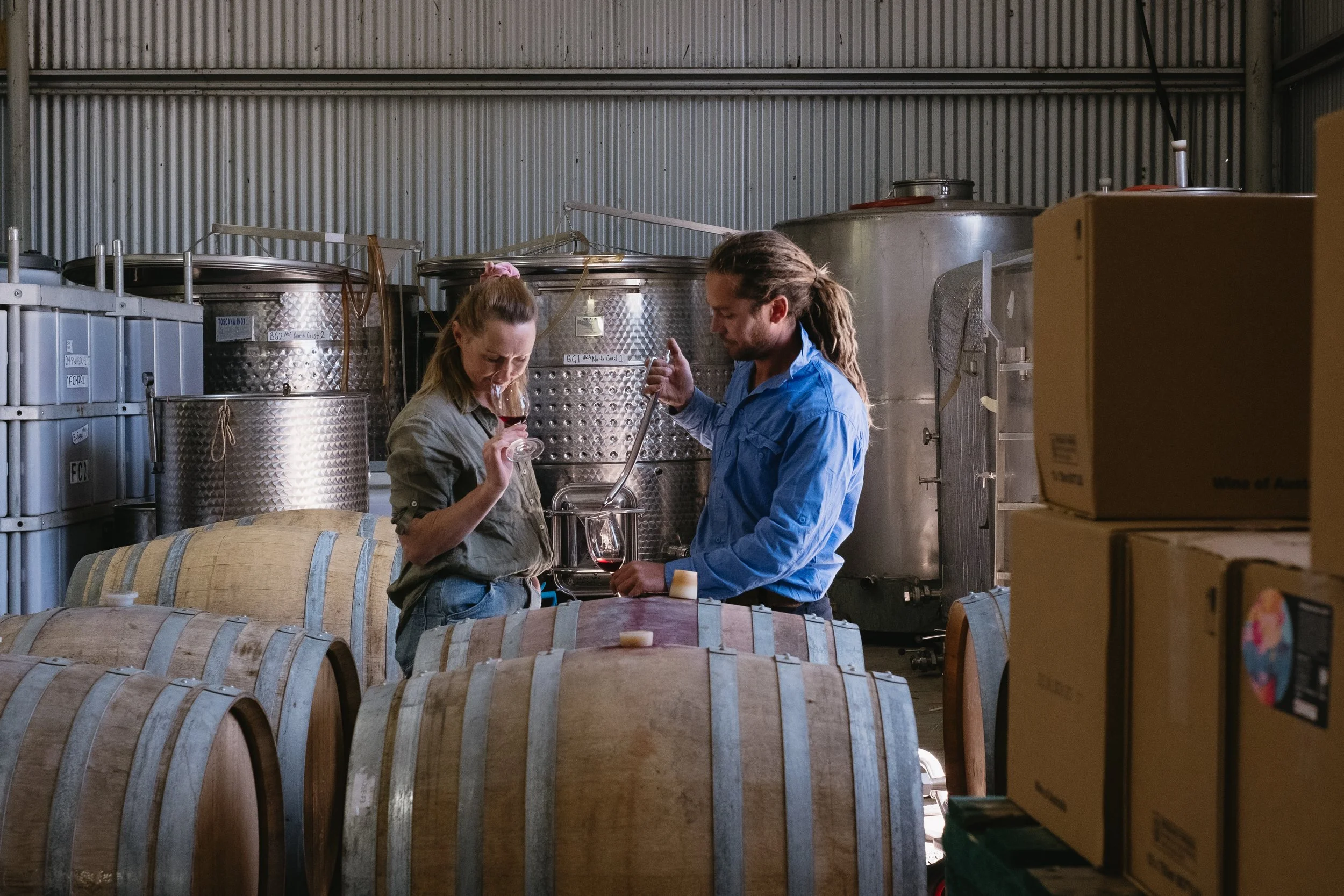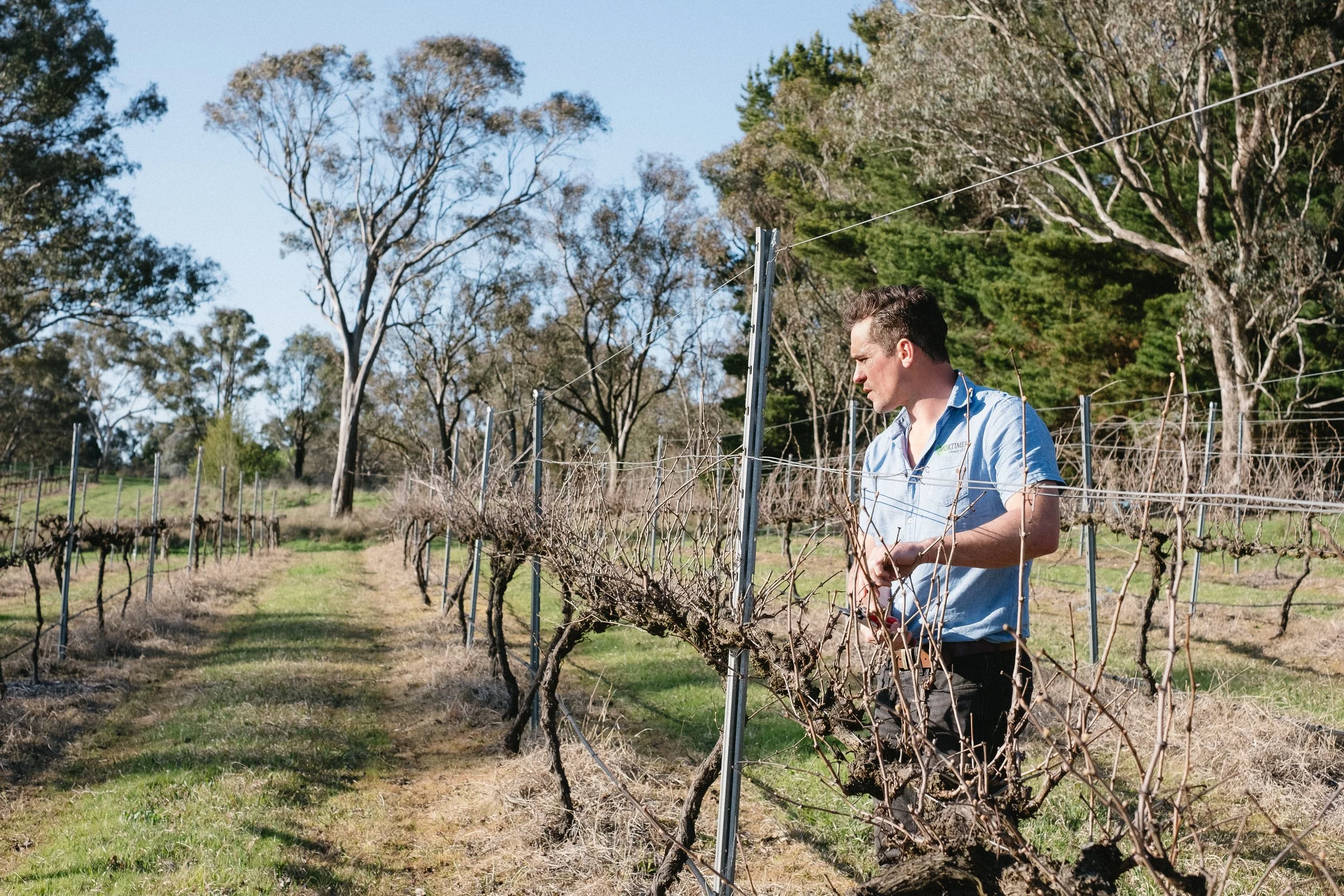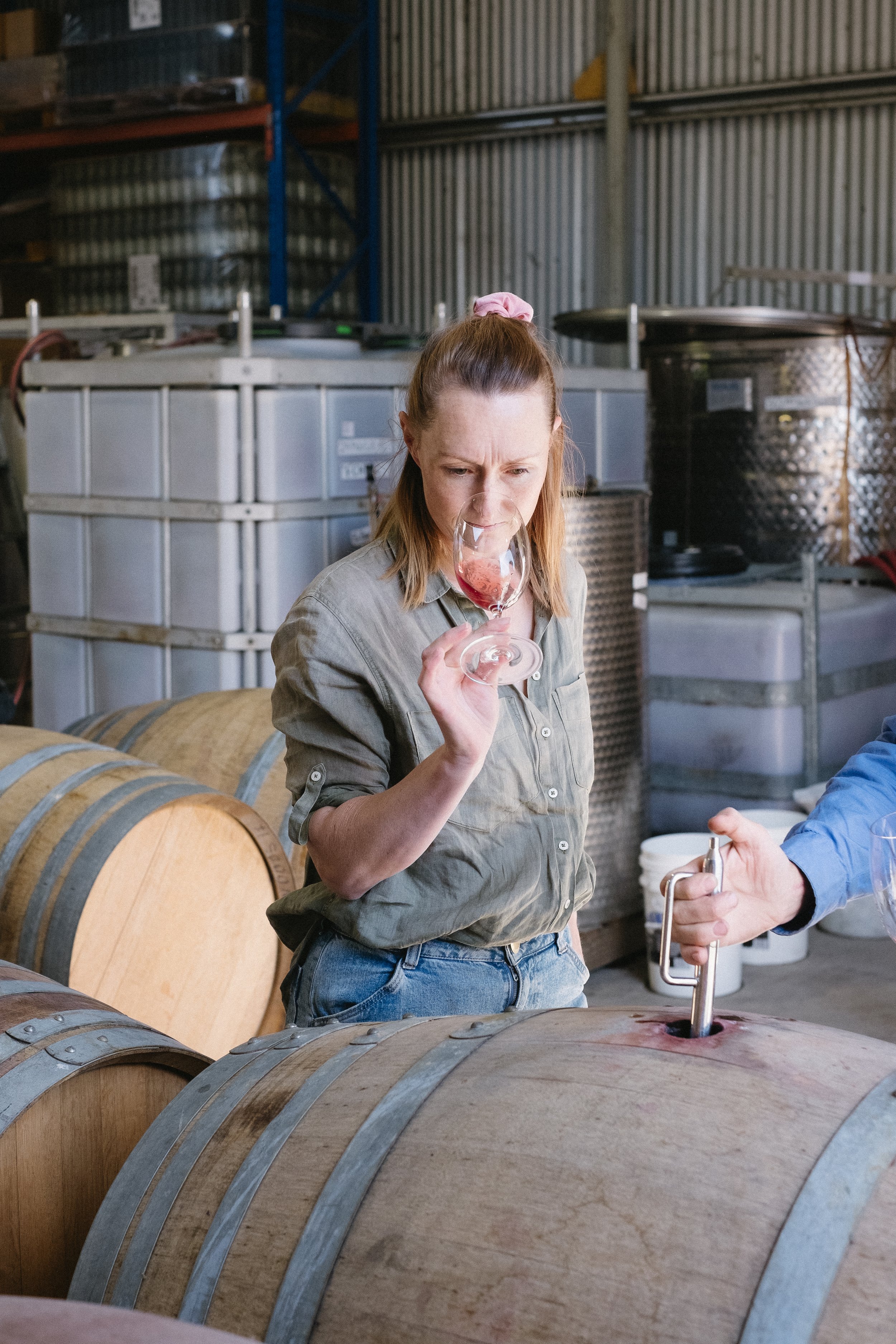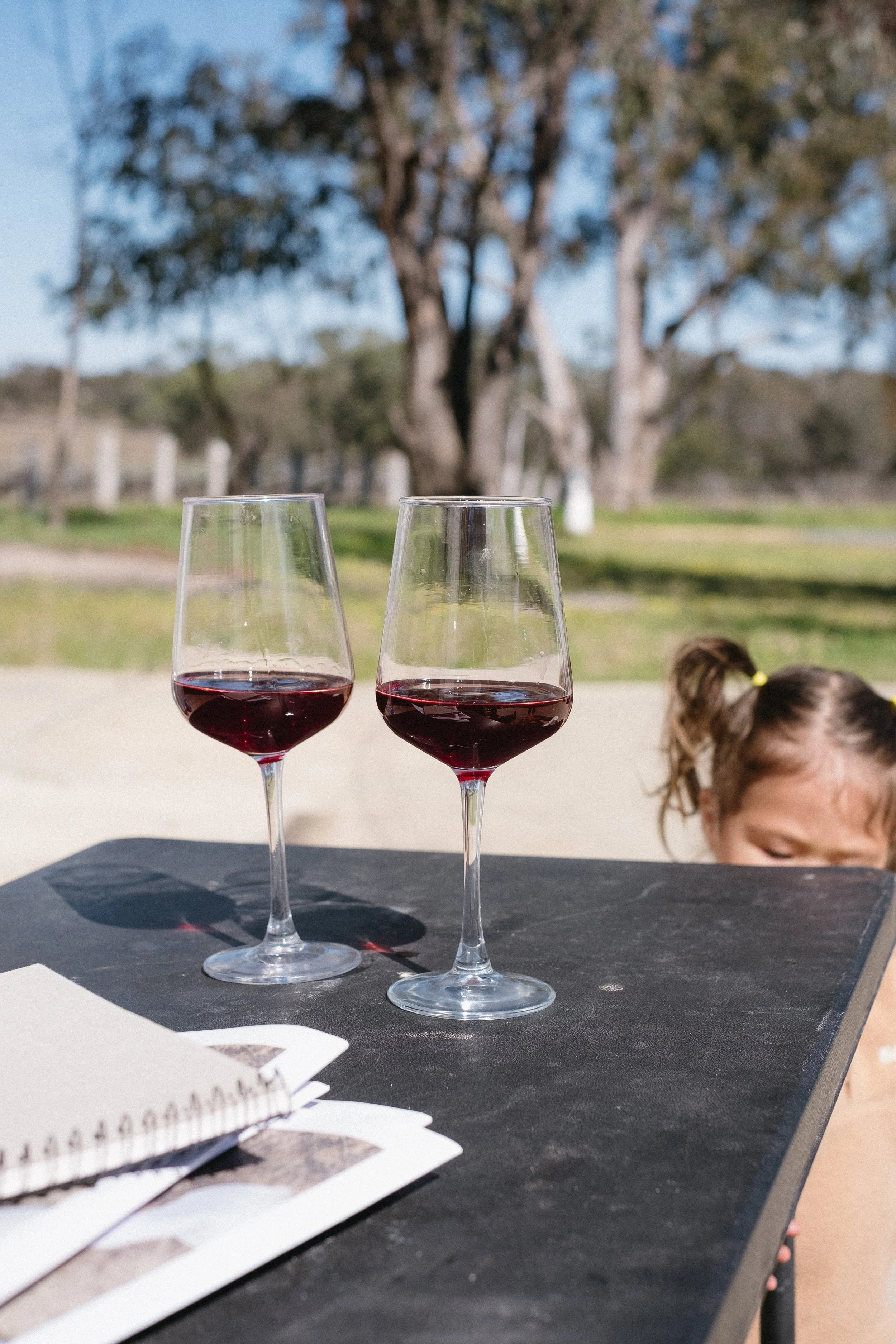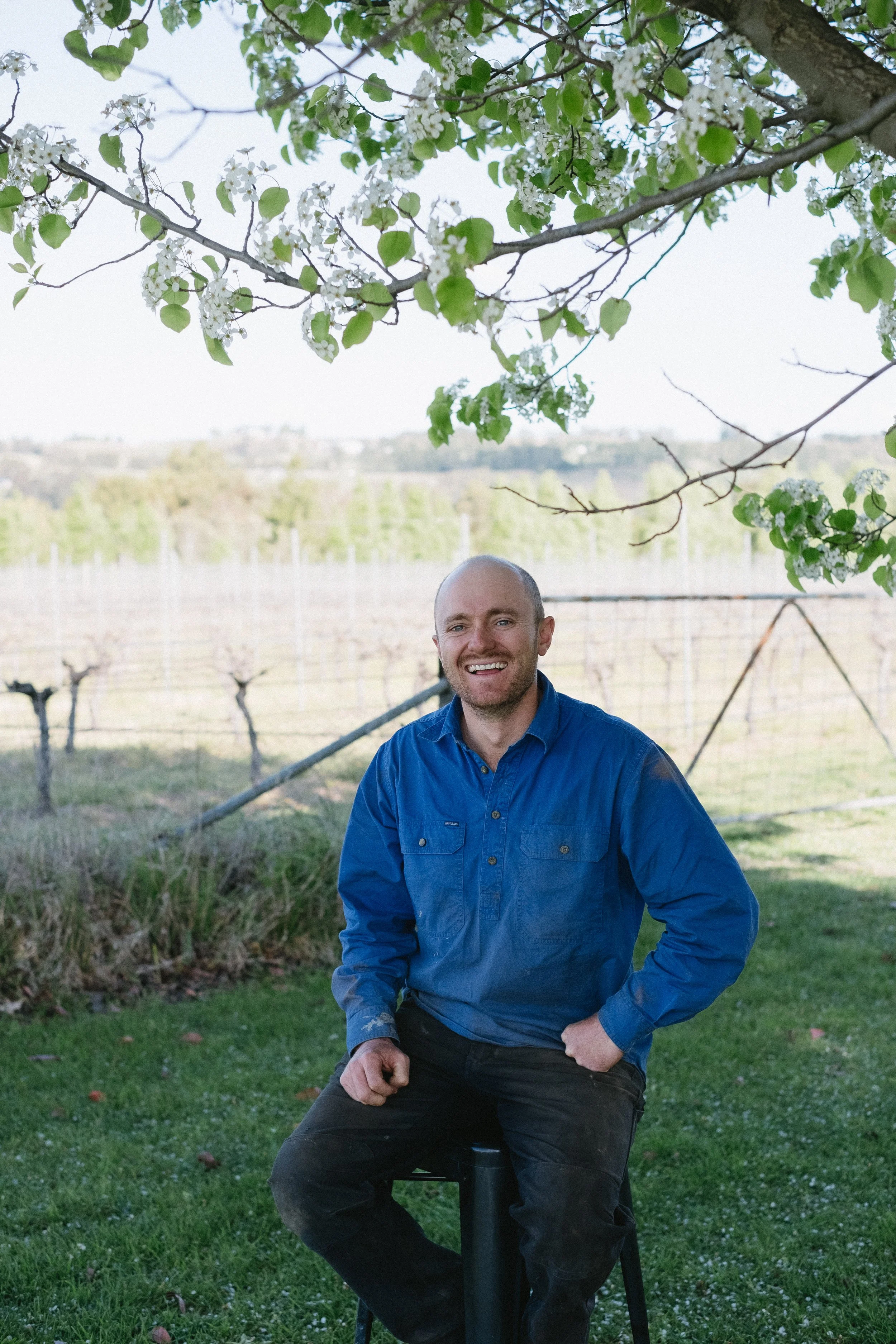Next - Gen Winemakers
Interview by Alice Armitage Photography by Alice Armitage
Wine is something that can feel hard to access, with a vibe of snobbiness that’s a real deterrent for the average person. But there is an up and coming wine region that is reshaping the way we all perceive and experience wine. Compared to other Australian wine regions Orange’s wine story is a short and fresh one, but it’s rapidly blossomed and today it’s home to a tight-knot community of growers and producers who are refining expressions and embracing modern ideas. I spent an extended weekend in the region, getting to know six up and comers in the industry. Learning what is drawing young winemakers to the region.
Alice Jarrett | See Saw Wines | Brand Manager
Tell me a little about yourself and See Saw Wines.
My parents Pip and Justin started the business almost thirty years ago, and now my brother, my sister and I have all joined the business as well. I predominately work across brand and marketing, but I have a background in river management. Before coming back to the family business, I spent time working in water policy for about ten years. I was living in places like Broken Hill, Menindee and Mildura. I moved back to Orange to work on a dam expansion project and somehow ended up polishing glasses at the back of the cellar door.
What do you feel is the biggest misconception about the industry?
That you don’t need really good grapes to make good wine. I think people lose sight of how important the grape growing process is as part of the industry, but also to the quality of the end product. There’s a whole agricultural side that is equally or if not more important – without the actual fruit growing, we don’t have a glass of wine at the end of the day.
What about the industry excites you most at the moment?
We’re facing a really challenging time in the industry. Alcohol consumption is down year on year across the globe and we’ve been in oversupply for a number of years now in the wine industry. We’ve faced a really challenging season. Yet, I feel like Orange as a wine region is so young and vibrant and that’s really appealing to the current consumer. The wine market is making some really exciting changes to stay contemporary in the face of all these challenges and I really look forward to that future.
Well, necessity breeds innovation.
Absolutely. The wine industry has had a very traditional way of doing things for hundreds of years – for great reason, those traditions created a phenomenal product. But there are young people coming through that are willing to buck the trend. We’re also still learning about the science behind growing and making wine. It’s exciting to see the industry taking that onboard and making something great with it. Our product could look completely different in the years to come and it’s exciting to be a part of that.
What is your favourite wine at the moment?
Of course, I’m going to say a See Saw wine, which is a bit shameless of me! But definitely our Gee Gee wine. It’s a really fun skin contact pinot gris and gewürztraminer blend. It’s very refreshing for summer because of all the rosewater, guava, rhubarb and tropical flavours. It’s absolutely scrumptious.
How would you describe the See Saw philosophy?
Above all, we’re about having fun. Wine is there to be enjoyed and to give people an experience. We want wine to be for everyone and for it to not be taken too seriously. As a brand we want people to have and create joy with our product.
Nadja Wallington | ChaLou Wines | Vigneron & Winemaker
What was it about winemaking that drew you to the industry?
I come from a small family winery, so I suppose I was born into it. I’ve just always been in the vineyard or in the winery. I guess there’s a bit of romance around it, especially the vintage time of year. There is a real energy that surrounds that. I just followed my feet into the industry, I suppose.
I believe you won a very impressive award for your wine recently.
We did. We won the Dark Horse Halliday Wine Companion Award this year, which is fantastic. It’s a great acknowledgement of the opportunity in the Orange wine region. It’s the first time a wine from this region has won and there were three other wines from the region shortlisted as well. But as a four-year-old brand, it’s gripping because it shows that we’re making great wines. Our ambition is to continue on this trajectory and to make some of the best wines Australia has to offer.
What do you think is the biggest misconception people have about winemaking?
Oh, that we add things. That we add flavours. People will ask things like did we add pepper into this wine to give it a peppery taste – which we don’t. That’s what makes wine so unique is that each variety has its own specific expression of all those flavours and attributes.
What advice would you give to a young person who is considering getting into the industry?
Go and get your hands dirty. Get as much experience as you can. It’s a fantastic career – you can travel, meet the most extraordinary people and decide where you want to be. At the end of the day, living and working in agriculture is not for everyone. But for those who fall in love with it, it’s a love you’ll have for a lifetime.
How would you describe your approach to wine growing?
It’s about growing the best grape and then just holding its hand through the rest of the process. Just letting it do its thing. I am a career winemaker and I’ve made wines for much bigger operations. I’ve manipulated wines and in a sense that formed my craft. We’re not just haphazardly creating wines, there is a very considered approach to every wine, every vintage.
In your opinion, what makes wine growing different from other agricultural industries?
We’re growing the product – grapes – and then we have the skills to turn those grapes into a high-value product, which we’re able to sell directly to the market. Whereas growers in most other industries are growing their product and hoping that the market will go their way. We get to have our hands over more of the supply chain and ultimately have a better relationship with the end consumer. The other unique thing about wine is that it’s a translation of that time and place. It is captured for a lot longer than a grain of wheat. It’s turned into this art that’s then consumed and shared with people. There’s a real experience and romance connected to that. It’s a real privilege to be a part of that – turning grapes into wine feels like an art form.
Elliott Paradoxa | Pride of Lunatics | Winemaker and Caretaker
What is it about the industry that excites you the most?
Probably the natural winemaking phenomena. I think it is bringing wine production back to the farming side of things. The idea behind natural wine is that you focus on using the best farming practices to increase the life, vitality and fertility of the land. Then in the winery, you do as little as possible – the wine just makes itself. That way, your wine is the best expression of the land. It’s the most pure way to farm and make wine. The true terroir.
What is it about the Orange region that you’re particularly excited about?
Broadly speaking, the region is really coming of age – in the sense that a lot of vines around here were all planted in the 80s and 90s. As the vines hit that twenty/thirty-year mark, vineyards generally start to really show their terroir expression best. That means that the Orange region is really maturing into a solid wine region, which is a very exciting thing to be a part of.
Could you tell me a little more about your farm here?
We’re ever so slightly out of the elevation of the Orange wine region and about forty-five minutes out of Orange, so here we are technically in the Central Ranges region. The vines here on the farm are about twenty-five years old and we’ve got ninety hectares of land. It’s a really interesting spot out here. There’s probably no other vineyards out here. It’s even younger than the rest of the wine region, which
is really exciting in itself. It’s nice being out of the way and doing our own thing.
What do you feel has been your biggest challenge since taking on your own winery?
The biggest challenge has definitely been the frosts we’ve faced in the vineyard this year. We’re so new to this. We’re only three and a half years in and we’ve only had two harvests here in the vineyard. The frosts have meant we’ve had a really limited amount of grapes, which limits how much wine we can make. When supplies are tight, we don’t get to play with the fruit as much. But it also meant that we weren’t so tied to being on the farm all of the time. We were about to get out on the road and sell, so there’s always a silver lining.
Daniel Mortimer | Mortimers Wines | General Manager
Can you tell me a little about yourself and how you got into wine?
I’m one of five boys and my parents moved out here when we were little, not wanting to raise all of us in the city. At the time, this place was forty acres with just four fences. Our neighbour was a winemaker and slowly convinced Dad to plant some vines in 1995. In 2001, we got our first wine back. I was eleven and we all sat around in the family room trying it out. We were selling wine out of the house for the first few years and then we expanded to having a cellar door here on the property.
You also have quite the rugby league legacy in your family right?
My dad was a very successful player, it’s a huge part of our story and who we are.
So were you any good at rugby league?
I did alright. I went to Sydney to play when I was seventeen, straight out of school. I kind of hated growing up on a winery. It was so much hard work! But when I moved to Sydney, I realised that girls thought it was very romantic and I got a lot more interesting very quickly! I played in the NRL for about ten years, for the Parramatta Eels, then moved across to the Sydney Roosters. We won a premiership in 2013, which was a pretty cool experience. I had a stint playing for the Gold Coast Titans before spending a couple of years playing in England. It was after that I started my transition back to Orange and into the family business.
What is your favourite part of the winemaking process?
The wine we’re drinking today, I helped plant those vines when I was six years old. It gives me such a buzz that all of the hard work, that’s literally generations in the making, has turned into something that people really enjoy. It’s my favourite part of the process, interacting with people when they’re having that experience – no one comes to a cellar door in a bad mood! Being with people in the cellar door also allows you to see trends in your wine. You’re watching people’s reactions when they are tasting your product and you get to take that on board. Those interactions give you the information and feedback you need to continue to make the best wine possible and wine that people want to drink. It’s also the positive reinforcement that you’re doing something right.
It’s very apparent that you’re connected to your family legacy and its role in how you produce wine. You have your own kids now, how do you feel about the future of that legacy?
It’s a funny one, isn’t it? Every decision is a family one and I would love for my girls to have a similar upbringing as I did. I mean it’s farming, family is so embedded into the culture of that and every bottle that leaves this place has our family name on it. You don’t get much more connected to legacy than that and I want to approach everything we do with pride for that name for a long time to come.
What is it about the Orange wine region that you’re the most excited about?
There are so many wine regions that are really struggling. They’re pulling out vines and having a really hard time. But Orange seems to be growing in strength. It’s such a young region, relatively, with vines really only starting to be planted around here in the 80s, and individual labels starting to be released in the 2000s. The region is just really taking off.
What is your favourite wine at the moment?
Definitely our cabernet sauvignon, 2023 vintage. Cabernet sauvignon are known to be your bigger, bolder reds, but the cool climate reds, like the ones grown and made here in Orange, are a bit lighter. There is something very elegant about them.
What excites you the most about the winemaking industry at the moment?
There are a lot of challenges at the moment for the industry. There is a real oversupply of wines across Australia. A lot of that has to do with the export relationship we have had with China and new tariffs that have come into place. I haven’t been in the industry long, but when you speak to older winemakers they will all tell you this is a common cycle. Pair that with a few years that have been pretty tough in terms of the cost of living. I’m looking forward to seeing the other side of it. I’m excited for us to ride this out and to continue to see our business, and the industry at large, thrive.
What advice would you give someone considering getting into the industry?
If you want to be rich, don’t worry about it. But if you want to live a good life, then it’s a great industry to be in. It’s like social agriculture. It’s a very positive environment. A very diverse environment. For me, it’s about a life well spent.
Jackie Paradoxa | Pride of Lunatics | Winemaker and Caretaker
Could you tell me a little more about the wines that you make?
They’re super light and easy drinking. Honestly, they’re like a breakfast wine. It changes most days depending on my mood, but my favourite wine at the moment is our light red. It’s a blend of almost all of the varieties we grow. We grow seven different varieties here and the end product is pretty unadulterated. We spend our efforts in the vineyard, making the best grapes and we hope that’s reflected in the quality of the wine. We only do really small batches, so a single barrel usually, which means our wines are forever changing in the best possible way. It keeps things fun and delivers the best expression of each variety, each year.
What has been your biggest challenge since taking on your own winery?
Sales, to be honest. We have such a passion for this that I seem to keep overlooking that we need to actually sell what we’re making! Collectively we have a lot of experience in growing grapes and making wine, so those elements of the business feel natural and relatively easy, but neither of us has wholesale wine experience. After the first year of making wine, all of a sudden we had half a dozen pallets we needed to sell, so we had to get to work to figure that out. I love this product which really helps, but when it’s your own thing it’s hard to put yourself out there. There’s so much emotion involved in the selling process. It’s also a very competitive market and it’s going to take some time for us to establish ourselves and our brand.
How did you end up here, making wine in Manildra?
We were actually living in Tasmania and we thought this was going to happen for us there. In 2020 we’d looked at a plot of land down there and the plan was for us to plant vines there, but it didn’t work out and I ended up taking a job with a vineyard in Orange. So this region was back on the table. Eventually, we found this place and ultimately purchased it a few years ago. Turns out we love Orange. It’s such a beautiful town and we’ve met so many amazing people. The style of winemaking in the cooler regions is also very appealing to us.
What excites you the most about the winemaking industry at the moment?
Introducing people to the concept of natural wines is the thing that excites me. A lot of the time I don’t tell people that our wines are natural. That comes with a preconceived idea a lot of the time. But just having people really enjoy tasting the vitality of our wines is magic. We also find that a lot of people who aren’t wine drinkers seem to take to natural wines a little bit more – they’re more of an easy drink. They’re also lots of fun and all we ever ask people when they try our wines is to keep an open mind and to have fun with them!
Brendan Jarrett | See Saw Wines | Vineyard Manager
You grew up here on your family’s winery, but you’ve also spent time away doing other things. Tell me a bit about that.
When I finished school I went to Canada and did a grain harvest over there. Then I spent three years at university in Armidale studying agriculture and business. After that, I came back to Orange and was contract farming. I did a bit of everything, from deer farming to seed growing. I ended up doing a bit of contracting for the family and I eventually jumped into the family business full-time.
What is it about the winemaking industry that excited you the most?
For me, it’s definitely the organic side of things. When I started full-time here we had one organic farm that had been that way for, maybe, ten years. It was pretty hard going and wasn’t going that well. It was a big challenge to come in and develop large-scale organics across all three farms – and being able to do it in an efficient way that actually works. Now there’s so much more information and so many more tools etc.
Why do you think organics are so important?
Being organic doesn’t necessarily work across all agricultural industries. It’s just not always viable. But the great thing about organics is that it makes you think outside of the box. You can’t fall back on the easy route – you have to constantly think of better ways to do things. It links to our overall approach to sustainability and the idea of working towards minimal interventions. It all comes back to the age- old saying about leaving it better than what you started with. That’s the key to sustainability and I think organics are a big piece of that puzzle.
How many hectares of vines are you farming at the moment?
About one hundred and twenty at the moment. We fluctuate a fair bit because we’re constantly pulling out and putting in more vines. It’s not the most vines we’ve ever had, but it’s definitely the most we’ve had organically. It can be a real challenge, but as with all things, scale can be your friend.
What is it about the Orange region that you feel is particularly positive about at the moment?
Certainly the young and energetic crowd. When it comes to the wine industry in the region, there are a fair few wine companies that are looking to step out of the mould and try different things. The location of Orange is a real winner – we’re on the doorstep of Sydney and it’s so accessible.
What advice would you give to a young kid thinking about getting into the wine industry?
There are so many different opportunities across the industry. There aren’t many agricultural businesses you can walk into and go from hospitality to farming, winemaking to operations, sales to exports. We’ve had people work for us that have had a go at all of these different elements until they decided what they really liked and wanted to be doing.
What do you think is the biggest misconception about growing wine?
I think most people don’t understand or know that winemaking is one of the only agricultural industries where every single thing is value-added here in Australia. Nothing goes off-shore and most of the value-adding is done by the same small operators. From planting the vine to pouring the bottle, it’s an entirely value-added process. I think that’s really cool.
If you’re interested in seeing more of our work - we hope you’ll consider subscribing to our physical paper here.


